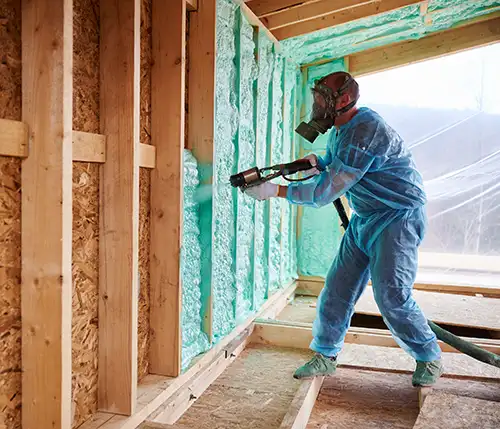
Call Us Today!
508-488-9999
Home Blown-in Insulation & Gutter Solutions
23 February 2024

In an era marked by heightened environmental awareness, the choice of insulation material plays a pivotal role in sustainable construction practices. Amidst various options available, spray foam insulation stands out as a champion of eco-friendliness, offering a multitude of environmental benefits that contribute to a greener future.
Energy Efficiency: Spray foam insulation forms an airtight seal, effectively minimizing air leakage and heat transfer. By creating a thermal barrier, it reduces the need for excessive heating or cooling, thereby lowering energy consumption and decreasing greenhouse gas emissions associated with energy production.
Reduced Carbon Footprint: The superior insulating properties of spray foam result in decreased energy demand for heating and cooling, translating to reduced reliance on fossil fuels. This leads to a significant reduction in carbon emissions, mitigating the environmental impact associated with traditional insulation methods.
Longevity and Durability: Unlike conventional insulation materials that may degrade over time, spray foam insulation maintains its effectiveness for decades. Its durability minimizes the need for frequent replacement, thereby reducing resource consumption and waste generation.
Air Quality Improvement: Spray foam insulation creates a barrier against moisture infiltration, inhibiting the growth of mold and mildew. By fostering a healthier indoor environment with improved air quality, it contributes to occupant well-being and reduces the need for harsh chemical treatments.
Minimal Environmental Impact during Installation: The application process of spray foam insulation generates minimal waste, as it expands to fill cavities and gaps efficiently. Moreover, many formulations are free of harmful ozone-depleting substances, further minimizing environmental impact during installation.
Resource Efficiency: Spray foam insulation requires fewer raw materials compared to traditional insulation methods to achieve the same level of thermal resistance. Its high expansion ratio allows for efficient use of resources, reducing overall material consumption and waste generation.
Versatility and Adaptability: Spray foam insulation can be applied to various surfaces and contours, adapting seamlessly to irregular shapes and structures. This versatility minimizes material waste and ensures optimal coverage, maximizing the environmental benefits of insulation projects.
Potential for Renewable and Recycled Content: Some manufacturers offer spray foam insulation formulations that incorporate renewable or recycled materials, further enhancing its eco-friendly profile. By supporting sustainable sourcing practices, these formulations contribute to a circular economy and reduce dependence on virgin resources.
In conclusion, spray foam insulation emerges as a sustainable choice for environmentally conscious construction projects. Its energy efficiency, durability, and minimal environmental impact throughout its lifecycle make it a preferred option for reducing carbon emissions, conserving resources, and promoting healthier indoor environments. If you prefer spray foam insulation for your home contact Custom Insulation Company!